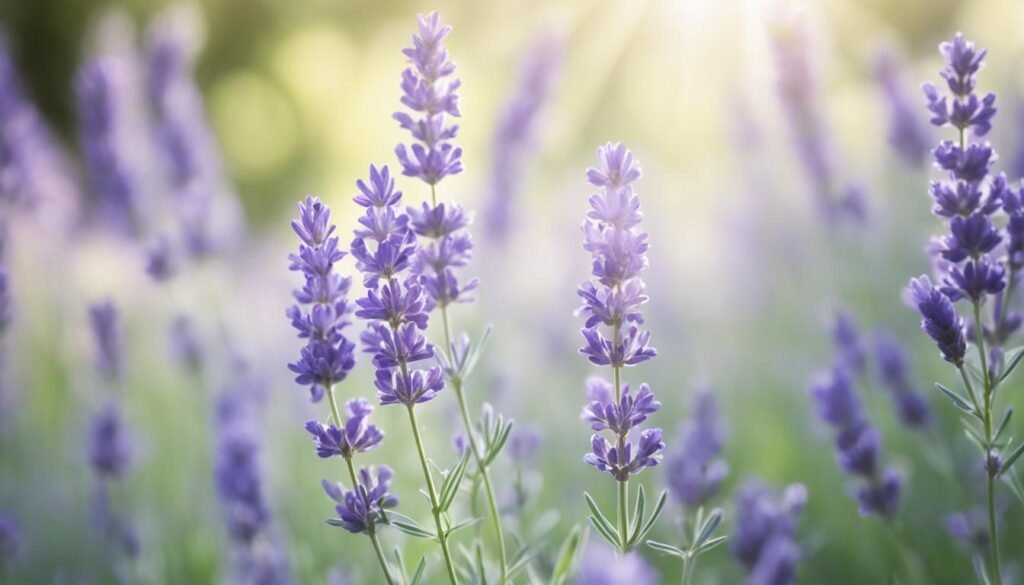Anxiety affects millions of people around the world. It can be tough to deal with. While doctors often suggest medication and therapy, many are looking for natural ways to feel better. This guide looks at how herbal remedies can help ease anxiety and bring peace.
Table of Contents
ToggleKey Takeaways
- Explore a variety of natural herbal remedies for anxiety relief
- Discover the science-backed benefits of herbs like chamomile, lavender, and valerian
- Learn about the proper usage and dosage of these calming botanicals
- Understand the potential interactions and precautions associated with herbal remedies
- Incorporate omega-3 fatty acids as a natural way to nourish the mind and manage anxiety
Understanding Anxiety and its Impact
Anxiety is a common mental health issue that affects many people around the world. It’s a normal response to stress, but it can become too much and affect life quality. Knowing about anxiety symptoms, causes, and how to manage it is key to finding help.
Symptoms and Causes of Anxiety
Anxiety shows in many ways, like a fast heart rate, sweating, and tight muscles. It also includes feeling too worried, irritable, and having trouble focusing. Things like genes, past traumas, ongoing stress, and health issues can lead to anxiety.
The Importance of Managing Anxiety
Not dealing with anxiety can lead to more problems, like depression, using too many substances, and health issues. It’s important to find ways to handle anxiety, like changing your lifestyle, seeing a therapist, and trying natural remedies. By tackling anxiety early, people can feel better and handle everyday life better.
“Anxiety is a thin stream of fear trickling through the mind. If encouraged, it cuts a channel into which all other thoughts are drained.” – Arthur Somers Roche
The Power of Natural Herbal Remedies
There’s a growing interest in natural herbal remedies for managing anxiety. These remedies have been used for centuries to help people feel calm and reduce stress. They offer a holistic way to find relief from herbal anxiety relief.
Natural herbal remedies are gentle and don’t lead to addiction. They have fewer side effects compared to many drugs. This makes them a good choice for those looking for a balanced way to handle their anxiety.
“The beauty of natural herbal remedies lies in their ability to work in harmony with the body’s own systems, providing a gentle yet effective solution for anxiety.”
Natural herbal remedies can be part of a full plan to manage anxiety. They work well with mindfulness, therapy, and changing your lifestyle. This approach helps people take charge of their health and feel more in control of their anxiety.
When using natural herbal remedies, it’s key to work with healthcare experts. They can help with the right amount to take, any possible side effects, and what’s best for you. This ensures you’re using these remedies safely and effectively in your anxiety plan.
By exploring the healing power of plants, people can find relief from herbal anxiety relief. This leads to a better sense of calm and well-being. With the right knowledge and approach, managing anxiety can be a more holistic and empowering journey.
Chamomile: A Calming Ally
Chamomile is a well-loved herb known for its calming effects. It’s famous for easing anxiety and helping people relax. Let’s look into the science behind Chamomile Benefits and how it helps with Chamomile for Anxiety.
Benefits and Uses of Chamomile
Many studies have looked into chamomile’s healing powers. They found it has compounds like apigenin, which helps reduce anxiety and depression. Drinking chamomile tea or taking supplements can lessen anxiety in people with anxiety disorders.
Chamomile does more than calm the mind. It also fights inflammation, kills bacteria, and helps wounds heal faster. You can use it on the skin to ease irritation, reduce swelling, and speed up healing of small cuts.
For those looking for natural ways to calm their nerves, chamomile is a great choice. You can drink chamomile tea, take supplements, or use essential oil for aromatherapy. This herb offers a gentle way to find peace and calm.
| Therapeutic Benefits of Chamomile | Research Findings |
|---|---|
| Anxiety Reduction | Studies have shown that chamomile can help alleviate the symptoms of generalized anxiety disorder and social anxiety. |
| Anti-Inflammatory Properties | Chamomile contains compounds that can reduce inflammation, making it useful for treating skin irritations and promoting wound healing. |
| Antimicrobial Effects | Chamomile has been found to possess antimicrobial properties, potentially offering protection against certain bacterial and fungal infections. |
Lavender: A Soothing Scent for Relaxation
The fragrant lavender plant has been used for centuries to help people relax and reduce stress. It’s a natural way to ease Lavender for Anxiety. By using lavender, people can feel more calm and well.
Lavender’s scent can affect the limbic system in the brain, which handles emotions. When you smell lavender, it can lessen anxiety, cut down stress, and make you feel more relaxed. That’s why it’s often used in essential oils, bath products, and even in cooking.
- Lavender essential oil can be mixed with a carrier oil and applied to the temples, wrists, or neck for calmness.
- Drinking a warm cup of lavender tea can also calm the mind and body, helping to reduce anxious thoughts.
- Adding lavender to your daily life, through aromatherapy or tea, is a simple way to handle Lavender for Anxiety and find peace.
“Lavender can calm the mind and body, making it a gentle remedy for anxiety.”
Using lavender can be a natural way to deal with anxiety and improve well-being. Whether it’s through essential oils, tea, or other products, lavender offers many Lavender Benefits. It’s a natural way to relax and find peace.

Valerian: Nature’s Gentle Sedative
Valerian has been used for a long time and is now known for helping with anxiety and improving sleep. Many studies have looked into how it can reduce anxiety. They show it can make you feel calm and help you sleep better.
Dosage and Safety Considerations
When using valerian for anxiety, knowing the right amount and safety tips is key. The recommended dosage of valerian is 300 to 900 milligrams a day, split into doses. Start with the lower dose and increase it as needed, with a doctor’s advice.
Valerian is usually safe, but be careful because it can affect some medicines like sedatives and blood thinners. It might make you feel sleepy, give you headaches, or upset your stomach, especially if you take too much. If you’re pregnant or breastfeeding, talk to your doctor before taking valerian.
| Valerian for Anxiety | Valerian Dosage |
|---|---|
| Valerian has been extensively studied for its potential to alleviate anxiety symptoms. | The recommended dosage of valerian typically ranges from 300 to 900 milligrams per day, taken in divided doses. |
| Its anxiolytic properties are attributed to its ability to modulate neurotransmitters, such as GABA, which play a crucial role in regulating mood and stress response. | It’s important to start with the lower end of the spectrum and gradually increase the dosage as needed, always under the guidance of a healthcare professional. |
| Valerian is considered a safe and natural alternative for managing anxiety, with a long history of traditional use. | Caution is advised, as valerian can interact with certain medications and may cause side effects, particularly in higher doses. |
Always talk to a healthcare professional before adding valerian to your routine for anxiety. Knowing the right dosage and safety tips can help you see its benefits. This natural sedative can be a gentle way to help you relax.
Lemon Balm: A Versatile Herb for Anxiety Relief
Lemon balm is a fragrant herb that has been used for centuries to help people relax and reduce stress. It’s a natural way to manage Lemon Balm for Anxiety. You can use it in teas, tinctures, or topical applications to find relief.
One key Lemon Balm Benefit is how it calms the nervous system. It has compounds that work with GABA receptors in the brain. This helps lower anxiety and makes you feel more relaxed. Studies show it’s good for easing mild to moderate anxiety, making it a great part of a wellness plan.
You can enjoy lemon balm in many ways. For a calming drink, try a cup of lemon balm tea. Or, take it as a tincture or supplement for easy anxiety relief on the go.
Lemon balm isn’t just for inside you. Its scent is great for relaxing body oils, lotions, and bath products. Using these products or smelling the scent can help you feel more calm and well.
If you’re looking for a natural way to handle anxiety or want to add to your daily stress management, lemon balm is a good choice. This ancient herb can help you find peace and balance in your life.
Herbal Remedies for Anxiety
There are many natural options for easing anxiety, besides what we’ve talked about. These Herbal Remedies for Anxiety have special properties. They can help those looking for natural ways to handle their worries.
St. John’s Wort: A Mood Booster
St. John’s Wort is known for lifting moods. It’s studied for helping with mild to moderate Anxiety Relief Herbs. This plant may balance brain chemicals, easing anxiety and depression symptoms.
Ashwagandha: An Ancient Adaptogen
Ashwagandha, from Ayurvedic medicine, is an adaptogen. It helps the body handle stress. For centuries, it’s been used to calm the mind. It’s a top choice for natural Anxiety Relief Herbs.
Kava: A Traditional Anxiety Reliever
Kava comes from the South Pacific and has been used for anxiety. It may calm the brain by affecting GABA receptors. But, it can be harmful to the liver, so talk to a doctor before using it.
Passionflower: A Gentle Calming Herb
Passionflower is a plant that has helped people relax for centuries. It’s thought to increase GABA in the brain, reducing anxiety and stress.
Adding these Anxiety Relief Herbs to your routine can be a gentle way to support your mental health. Always talk to a healthcare professional before trying new remedies, especially if you have other health issues or take other medicines.
St. John’s Wort: A Mood Booster
St. John’s Wort is an herb with a long history. It’s known for helping with anxiety. Many studies show it can improve mood and mental health.
Potential Interactions and Precautions
St. John’s Wort can help with anxiety. But, it’s important to know about possible interactions and precautions. It can affect how some medicines work, like antidepressants, birth control, and blood thinners.
Before using St. John’s Wort, talk to a healthcare professional. This is especially true if you’re taking other medicines. Pregnant or breastfeeding women should also be careful, as its safety in these cases is not fully known.
St. John’s Wort might cause agitation, dizziness, and stomach discomfort. Watch how your body reacts and stop using it if you have bad side effects.
“St. John’s Wort has shown promise in easing anxiety, but it’s important to be aware of its interactions and side effects.”
Knowing about St. John’s Wort can help you decide if it’s right for you. Always talk to a healthcare provider before using it for anxiety. This ensures you’re using it safely and effectively.
Ashwagandha: An Ancient Adaptogen
Ashwagandha is a key herb in natural anxiety remedies, with a long history in Ayurvedic medicine. It’s known for helping the body handle stress and boost overall health.
Research shows that Ashwagandha can ease anxiety symptoms like feeling irritable, having trouble focusing, and feeling restless. It also helps keep healthy levels of cortisol, a stress hormone.
This herb does more than calm you down. It can also improve your thinking and help you sleep better. Its adaptogenic properties help your body deal with stress, supporting your mental health.
“Ashwagandha has been used for centuries in Ayurvedic medicine to help the body adapt to stress and promote overall well-being.”
Adding Ashwagandha to your self-care could be a great way to handle anxiety and feel calmer and more resilient. It’s a natural option for dealing with daily stress or supporting your mental health over time.
| Key Benefits of Ashwagandha | Research Findings |
|---|---|
| Reduces Anxiety Symptoms | Studies have shown that Ashwagandha can help reduce symptoms of anxiety, such as irritability, difficulty concentrating, and restlessness. |
| Supports Healthy Cortisol Levels | Ashwagandha has been found to support healthy cortisol levels, a key hormone involved in the body’s stress response. |
| Enhances Cognitive Function | Ashwagandha is known for its potential to enhance cognitive function and improve sleep quality. |
| Promotes Adaptability to Stress | As an adaptogenic herb, Ashwagandha helps the body adapt to various stressors, making it a valuable tool in supporting overall mental health and well-being. |
Kava: A Traditional Anxiety Reliever
Kava is a traditional herb from the Pacific Islands. It has been used for centuries to help people feel calm and reduce anxiety. This plant is now being studied for its possible benefits in easing anxiety naturally.
Safety Concerns and Responsible Use
Kava is known for helping with Kava for Anxiety, but safety is key. It’s important to use it wisely to avoid liver damage from improper use or mixing it with other drugs. Always talk to a doctor before adding kava to your health routine.
- Buy kava from trusted sources and take it as directed.
- Be careful if you have liver problems, are on medication, or have a surgery coming up. Talk to a doctor first.
- Avoid using kava too much or for a long time to prevent bad side effects.
Knowing about Kava for Anxiety and Kava Safety helps you make smart choices. This traditional herb can be a safe way to help manage your anxiety.
“Kava has been used for centuries in the Pacific Islands to promote calmness and relaxation. Its potential as a natural anxiety reliever is a significant area of research and interest.”
Passionflower: A Gentle Calming Herb
People are looking for natural ways to ease anxiety, and Passionflower is a top choice. This plant is known for its calming effects and is gaining attention from scientists. It helps soothe the mind and encourage relaxation.
Passionflower comes from the Americas and has been used for years to help with anxiety, sleep issues, and pain. It has compounds that work with the brain to calm it down. This can make you feel less anxious and more relaxed.
The Benefits of Passionflower for Anxiety
Studies show that Passionflower can be as good as some drugs for anxiety. It doesn’t have the risks of addiction or bad side effects. This makes it a great option for those looking for natural relief.
- Reduced anxiety and stress levels
- Improved sleep quality
- Enhanced mood and overall well-being
- Alleviation of physical symptoms of anxiety, such as muscle tension and rapid heartbeat
Adding Passionflower to your routine can be a gentle way to ease anxiety. It helps balance your mind and body.
“Passionflower has been a game-changer in my journey to manage anxiety. Its calming effects have helped me feel more grounded and in control, without the side effects of pharmaceutical options.”
– Emily, Holistic Health Enthusiast
Omega-3 Fatty Acids: Nourishing the Mind
Omega-3 fatty acids are key for mental health. They are mainly found in fatty fish. Studies show they can help with anxiety and improve brain function.
Many studies have found the Omega-3 Benefits for anxiety. Omega-3s, like EPA and DHA, calm the brain. They help manage mood and reduce anxiety symptoms. These fatty acids work by changing neurotransmitters and lowering inflammation.
Omega-3s are also important for brain health. They help neurons work better, improve how they connect, and support brain growth. This can lead to better focus, memory, and emotional health.
| Omega-3 Source | EPA (mg) | DHA (mg) |
|---|---|---|
| Salmon (3.5 oz) | 1,100 | 700 |
| Mackerel (3.5 oz) | 800 | 1,000 |
| Sardines (3.5 oz) | 500 | 900 |
To get enough Omega-3 for Anxiety, add more Omega-3-rich foods to your diet. Or talk to your doctor about supplements.

“Omega-3 fatty acids are like a natural anti-anxiety medication, helping to calm the mind and promote overall mental well-being.”
Conclusion
Natural herbal remedies can help manage anxiety in a holistic way. Chamomile and Lavender calm the mind with their soothing effects. Valerian acts as a gentle sedative, while St. John’s Wort can lift your mood.
These natural solutions are great for adding to your anxiety management plan. They offer a deep and natural way to feel better. By using herbs, you can find balance and improve your overall well-being.
If you’re dealing with anxiety, these Herbal Remedies for Anxiety could be a big help. They can support you in getting your mental and emotional balance back.
When trying these remedies, talk to health experts and watch for any reactions. Find the herbs that work best for you. With knowledge and a desire to use nature’s healing power, you can start a journey to a calmer, happier life.
FAQ
What are the most effective herbal remedies for anxiety?
Top herbal remedies for anxiety include chamomile, lavender, valerian, lemon balm, St. John’s Wort, ashwagandha, kava, and passionflower. These herbs are known for calming and reducing stress.
How does chamomile help with anxiety?
Chamomile is famous for its calming effects. It helps reduce anxiety by making you feel calm and improving sleep.
What are the benefits of using lavender for anxiety?
Lavender is known for its calming scent. It helps reduce anxiety and stress. You can use it as essential oils, teas, or topical applications.
How does valerian help with anxiety?
Valerian is a natural sedative. It helps improve sleep and reduce anxiety. But, be sure to follow the right dosage and check for drug interactions.
What are the benefits of using lemon balm for anxiety?
Lemon balm helps with anxiety and relaxation. It reduces stress, improves mood, and boosts cognitive function. You can take it as tea, tincture, or apply it topically.
How can St. John’s Wort help with anxiety?
St. John’s Wort boosts mood and may help with anxiety. It works by supporting brain neurotransmitters. But, watch out for drug interactions.
What are the benefits of using ashwagandha for anxiety?
Ashwagandha is an ancient herb that helps the body handle stress. It may reduce anxiety and improve mental health.
How can kava help with anxiety?
Kava is an herb from the Pacific Islands that helps with calmness and anxiety. But, use it carefully due to safety concerns.
What are the benefits of using passionflower for anxiety?
Passionflower is soothing and can reduce anxiety and improve sleep. It calms the mind and body, making it a good natural remedy for anxiety.
How can omega-3 fatty acids help with anxiety?
Omega-3 fatty acids improve mental health, including reducing anxiety. They support brain function and emotional well-being, making them great for managing anxiety naturally.













